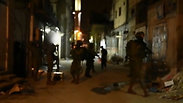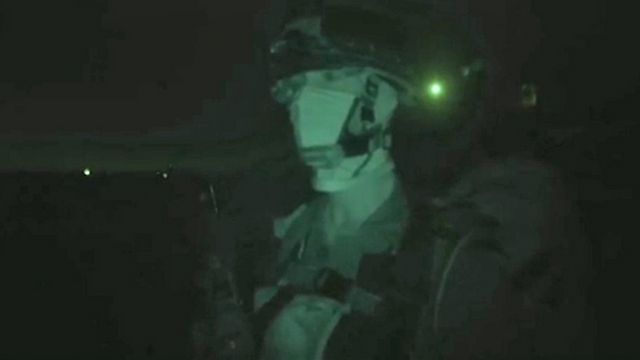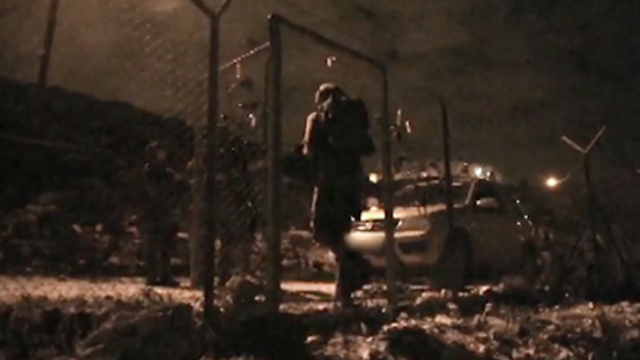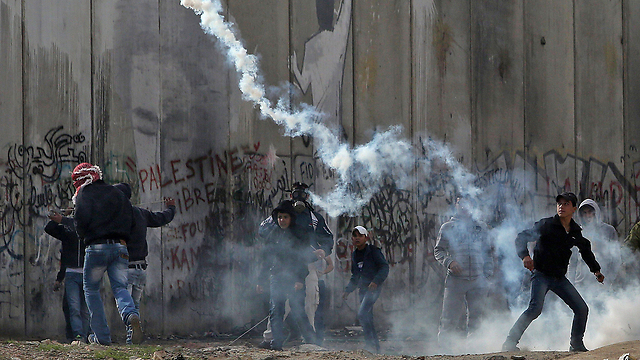
Inside the conflict: One night with elite troops in West Bank
Ron Ben-Yishai joins IDF combat soldiers from Duvdevan during an operation in Qalandia refugee camp, encounters the conflict first hand, and comes to an discomforting conclusion.
Until that fateful moment it had been a relatively quiet night operation. There had been a few whistles, some shouting and a lot of stones. Three shots had been heard from the adjacent alley as Duvdevan fighters made their way through in single file.
"It was gunfire," says the unit commander and begins trying to identify who had fired and why. It quickly becomes clear that it had been a skirmish in an alley in which another force from the unit was operating.
Most of the fire had come from inside a house, where troops had found weaponry, mainly ammunition. The troops securing the house had spotted two Palestinian youths approaching. One of the youths pulled out a gun and began firing at the soldiers from at a distance of several meters. The fighters, who had taken cover, were unhurt. The Palestinian youths fled. The Duvdevan commander ordered his troops to collect the empty shells, possible evidence at the gunmen's trial, if and when they were ever caught.
The Qalandiya refugee camp, just minutes from Jerusalem and a 40-minute drive from Tel Aviv, presents one of the main challenges for the IDF in the West Bank. It produces a great deal of terrorism and criminal activity. A considerable amount of the property and car theft in the Sharon region emanates from the camp, which for a long time has been more than that.
In Qalandia and the adjacent village reside some 100 thousand Palestinians, mostly impoverished. The Tanzim, the military wing of Palestinian President Mahmloud Abbas' Fatah movement, rule sovereign in the camp. The Palestinian Authority security forces do not enter, and in overall this is a strange beast: The refugee camp is on the other side of the separation fence and situated on the main road between Ramallah and Jerusalem. But 70 percent of its residents hold blue Israeli identity cards, even though they are supposedly in Palestinian Authority territory. Thus the government decided decades ago, and so it remains.
Between Jerusalem and Qalandia lies the large crossing through which tens of thousands of workers pass every day into East Jerusalem and Israeli territory. In times of tense security, such as during the fighting in Gaza last summer, some 15,000 people took to the streets here, clashing with IDF troops. It was hard to stop them, says one of the IDF officers in the sector, and there many were killed or wounded.
Even today, when the West Bank is buzzing as a result of the diplomatic Abbas has initiated and Israel's economic retaliatory measures – freezing the transfer of tax revenue - the camp is a major manufacturer of popular terror, from knives to explosive devices and gunfire.
"This is an ongoing formula," says a senior IDF officer in the Binyamin sector. "A member of the Palestinian security forces, who has for months been returning home to Qalandia without a salary, takes a gun and opens fire, and in return gets a little money from the Tanzim."
Catch a thief while he's sleeping
This week I asked and was assigned to closely follow a Duvdevan unit, whose fighters were supposed to take action against a serious terrorist cell of Tanzim members. Imperative to their success was quiet movement on foot to the camp, until they reached the homes and their inhabitants defined as a target. On the map it looks like nothing. A full mile, perhaps a little more. But in this mountainous area, and furthermore with Duvdevan fighters, it felt like a good few miles, and a genuine physical challenge. Not to mention the stench of the sewage pipe in which we had traversed.
The woman fighter from the Oketz canine combat unit, which was attached to the force, fell and was badly injured during the hike, and had to be evacuated on foot – with her dog. Nevertheless, the Duvdevan unit took up position on the outskirts as planned according to the timetable. The unit, whose members had never worked undercover, split into sub-groups and began to move on the various designated destinations in the camp. The ensuing barking of dogs could have woken the dead in their graves, and complete surprise was presumably taken out of the equation.
At the same time, hundreds more fighters from other units began to move: Border Police, artillery troops, a Haredi battalion and police officers, all heading for "hot" targets in Qalandia.
The operation had three objectives. The first was what the military calls "mowing the lawn" - detention of suspected terrorists and seizure of weapons, ammunition and explosives. Within Qalandia a great deal of weapons are produced, both for terrorist and criminal purposes.
The second objective was to catch thieves and their stolen property - from cars to shoes and so on. One of the groups of soldiers was accompanied by Chief Superintendent Moshe Finzi of the Sharon region police.
"I would like to catch the thief in bed, handcuff him and tell him, 'Not only can you get to my house, I can get to yours," Finzi says. During the night, he and four detectives under his command seized and returned to Israel a stolen car and no small amount of boxes, whose contents included shoes made in Italy.
The third objective, according to the commander of the operation, was to restore the operational freedom for security forces that had been eroded in recent months, since Operation Protective Edge in Gaza.
Stopping the erosion
The commanded of the Binyamin Brigade, Colonel Israel Shomer, indicated that there had been a clear increase in the scope and severity of popular terrorism since Protective Edge and recent events in Jerusalem.
"We enter the camp all the time on 'surgical' operations, but recently it has become necessary to conduct a large-scale operation in the camp, so as to prevent a loss of control," he says.
The brigade's operation was named "urban plowing", and probably not by chance. But the operation was more limited in scope than originally planned. It is possible assume that this was due to the fact that the IDF did not want to inflame the area or damage the rule of the Palestinian Authority in the eyes of the Palestinian street.
The aim was to maximize the benefits of the military without dead or wounded among the combatants and the Palestinians, and return this hornet's nest to normal as quickly as possible. Therefore, troops were given stringent rules of engagement "only in life-threatening situations."
The night at Qalandiya was successful. A similar operation at Dheishe refugee camp between Bethlehem and Hebron, saw one Palestinian killed and a Golani soldier wounded.
The Central Command operates on the instructions of the IDF chief of staff to be prepared for a large outbreak of violence in the West Bank in the coming months. The Qalandia operation aids in operational readiness and intelligence. The Shin Bet security service and Military Intelligence who accompanied the troops took care of this directive, among others.
'They threw at a TV at us '
The Duvdevan fighters move quickly and quietly on a street filled with cafes. We begin to hear shouts and whistles and soon enough the stones start coming. Fist-sized stones at first, and then blocks and even rocks, TVs and solar water heaters. It is clear that this will not be a picnic.
We cling to the walls on both sides of the street and keep moving, passing images of martyrs from the camp. One group of soldiers is taken by surprise by two young Palestinians, perhaps even teenagers, who attack the soldiers with their fists. It is a futile act. They tell a Shin Bet official that they did it out of anger and rage. After a short time, their handcuffs are removed and they are released.
"You have to admit that they are finding growing courage," says one of the commanders in a tone in which you can hear a certain esteem. "But we, we cannot give in, or Qalandiya will explode in our faces. If we do not 'mow the lawn' in large numbers, we will very soon be heading to an intifada. Not because of Hamas, but because of Fatah's Tanzim."
One of the soldiers fires tear gas and the rock-throwing stops for about ten minutes, but then resumes with even more intensity. The brigade commander reminds the troops to behave ethically.
"Even the wife and children of someone engaged in terrorism are innocent, and their dignity should be preserved. You do not need to break the house to search it," he says." You have to provide medical care for those who fire at us and record it too, so we are not treated as war criminals in the international arena."
You have to "strive to document" and you have to "see green", he tells the commanders before the operation begins. "Striving to document" is part of the war on consciousness; "seeing green" means taking care not to lose contact with the fighters and accounting for everyone in the force. There is also "seeing green equipment" – I am constantly learning the latest Hebrew, personal added value from "mowing the lawn."
Moving with the troops are members of the Coordinator of Government Activities in the Territories (COGAT), to guarantee humanitarian action and ensure that contact with the Palestinian Authority is carried out quickly and efficiently if necessary. This time in Qalandia it was unnecessary, especially as the Palestinians quickly realized that the operation involved a large volume of IDF troops, and not to engage with them.
Communication between Tanzim members is today conducted primarily through social media. IDF soldiers and commanders use tablets that have all the necessary information throughout the operation. The next intifada, if it erupts, will be a digital intifada.
Volcano erupts
At 4: 30 the Duvdevan commander reaches the conclusion that they have achieved everything they could. The brigade commander agrees and they decide to pull out of the camp. They climb into the vehicles waiting on a main street – and then the volcano erupts.
Palestinian youths, who were only waiting on the rooftops for this moment, are tracking the jeeps and armored vehicles moving down the main street. They are all too familiar with the IDF's strict rules of engagement, and some go down to the street and throw rocks and heavy objects at point blank range, which shatter the reinforced glass and turn the steel mesh into scrap metal.
The fighters in the jeep are shaken, but no one is injured and no shots were fired. The secret is skill and composure.
We arrive back at the Qalandia crossing. The fighters are unloading jeeps, removing their helmets and swapping stories. In those minutes, as I breathed a sigh of relief, I realized that Operation Defensive Shield of 2002 had never actually ended. The combat troops have changed and there is not the same intensity of fighting, but essentially nothing is different. We locked into a situation that might escalate - and might not.














